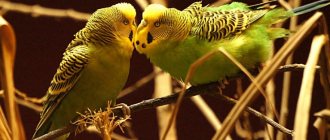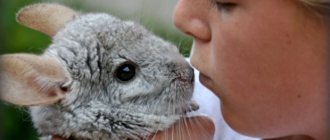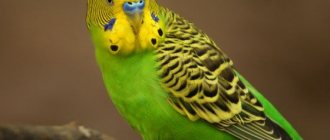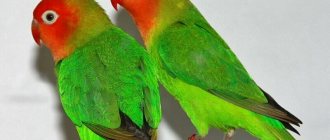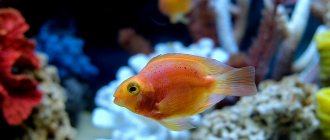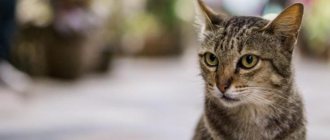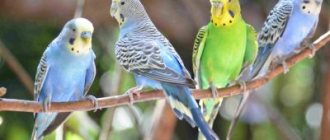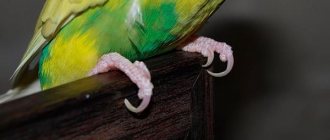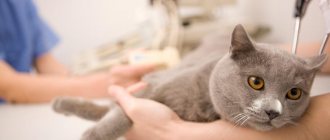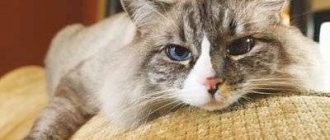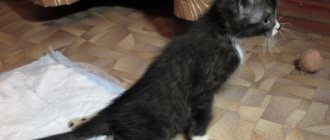Review of reasons
Bright, beautiful, shiny plumage is the decoration of parrots and a source of pride for their breeders. But what to do if a cockatiel, budgerigar, or lovebird plucks its feathers? Why do birds pull out their feathers? The owners' concern is not without reason, and it is very important to find the reason.
There is an opinion that feathers are pulled out and plucked by large parrots (brothers, macaws). But this is not so; self-plucking is observed in cockatiels, budgerigars, lovebirds, and parakeets.
A parrot plucks its feathers for the following reasons:
- unfavorable conditions of detention;
- frequent stress, severe fear;
- infectious, invasive diseases, fungal infections;
- unbalanced diet;
- violation of hygiene rules;
- dermatological diseases;
- frustration;
- metabolic disorder;
- endocrine pathologies;
- physical inactivity;
- molting (juvenile, French);
- hypo-, avitaminosis.
The parrot has lost its feathers.
A parrot may pluck feathers due to lack of attention, boredom, or loneliness. If your cockatiel itches or plucks its feathers, this behavior may be caused by depression. Domesticated parrots need not only proper care, but also affection, love, and care from the owner. Parrots may experience depression if they are separated from their partner, as well as if they change their usual place of residence. If birds are sad, sad and bored, in this case they can pluck all their feathers.
Too dry indoor air, poor microclimate, exposure to toxins and chemicals can also provoke self-plucking in feathered pets.
Parrots begin to itch severely due to a lack or, conversely, an excess of vitamins and minerals, due to dermatological diseases and mycoses. If a cockatiel plucks feathers, the bird suffers from severe itching; this can be caused by external parasites (mites, feather eaters).
Itching and skin irritation can be caused by chronic pathologies of the liver and kidneys. During periods of exacerbation of illnesses, the parrot begins to pluck its feathers.
Possible reasons for a parrot pulling out feathers
Parrots are one of the most fastidious birds on Earth, which is why there can be many reasons why a representative of this species may tug at its plumage. Among them, the main ones stand out, but each of them can be “continued” with a lot of other branches.
It was previously thought that self-plucking only occurred in large parrots such as macaws. However, small, more “domesticated” and familiar birds also began to suffer from this disease. Therefore, if suddenly your beloved budgerigar plucks its feathers, you need to think carefully about what was the reason for this.
Violation of containment conditions
When the conditions of detention are violated, the bird's skin suffers mercilessly. This is mainly due to an imbalance in the temperature balance in the room in which the cage is located. Too dry air, constant elevated temperature, excessive humidity are factors that interfere with the normal functioning of the parrot. It is also important to tidy up the cage and clean it on time - hygiene is necessary when keeping any pet.
Under no circumstances should you place the bird’s home near a radiator, fireplace or any other heating device. A place where there is often smoke and steam in the air should also not be a pet’s abode.
Skin irritation
The skin of a bird tends to become covered with fat, and this is an excellent environment for bacteria and parasites to live. This leads to an unpleasant itch, which the animal tries to get rid of. Then the parrot begins to pluck its feathers. To prevent such situations, you need to treat and disinfect everything that gets into the cage. Before giving a bird a twig or a new toy, it must be scalded with boiling water.
Nutrition
Improper nutrition also leads to the appearance of parasites on the skin and inside the bird’s body, and the development of various organ diseases (fatty hepatosis, hepatitis, etc.). Under no circumstances should the bird be allowed to eat human food (porridge, pasta, soups, etc.). Only specialized feed and plant (preferably cereal) foods filled with minerals and vitamins.
Stress
The most unpredictable thing of all is, perhaps, the moral state of the bird. Transportation, moving, a new cagemate or another cage, aggressive animals (dogs, cats), injury and physical pain. This can be compared to madness - the animal experiences stress and tries to get rid of it by depriving itself of its plumage.
It is important to note that the cause of stress can be the application of medicinal ointments and some actions for medical purposes. The lack of toys in the cage leads to boredom and anxiety.
Frustration
Frustration is a concept that stands for “not having all your needs met.” Usually the unmet need remains the need for communication and play. It is necessary to ensure that there is a sufficient number of toys in the cage, and some parrots require daily conversations with the owner. No chance to chat with the bird? We need to buy her a roommate!
Parasite infestation
Lack of appetite, the appearance of growths on the skin and liquid droppings are symptoms of the presence of living creatures inside the animal. How they penetrate the bird’s body is described above - through food or by forming on skin fat. On the skin there are feather eaters, lice eaters and scabies mites, and various types of worms can be found “inside”. This case requires immediately sounding the alarm, because parasites can completely deplete the body of their “victim”.
Ointments, specialized food and medicinal food additives help get rid of parasites. All this should be prescribed by a veterinarian.
Shedding
All decent breeders and owners should know about shedding. In each species of bird it occurs at different intervals. Usually once a year - in spring or autumn. Usually it passes quietly, its beginning can be noticed by the large number of feathers falling on the floor of the cage. But sometimes the parrot begins to get carried away, and abrasions and wounds appear on the skin, and new feathers are also pulled off. This is due to the itching that occurs when shedding. This situation requires contacting a veterinarian for advice, since there is no clear and precise solution to the problem of such a complication.
Depression
Domestic parrot birds are distinguished by their enthusiasm. They are often bought in order to listen to joyful chirping every day. But a lot of things can make a bird sad. For example, you should just stop paying attention to your pet. He will instantly fall into a state of stress, and then depression will begin.
Of course, this is not the only cause of depression. The death of a couple can also leave a serious mark on the animal’s memory, forcing it to endure some kind of mourning. This can happen after moving or lack of sleep. Yes, even ordinary inappropriate food can significantly shake his nerves! It is necessary to be attentive and monitor the condition of the parrot - both physical and moral. Otherwise, it cannot be avoided that he will begin to pluck his feathers.
Shedding
Molting is a natural physiological process in which birds change their old plumage to new ones. As a rule, parrots molt twice a year - in autumn and spring. During this period, the parrot devotes more time to the hygiene of its plumage. Replacing a feather causes itching, which is why your budgie itches. But if the molting proceeds normally, the parrot is healthy, and the change of plumage occurs evenly. There should be no extensive bald spots or bald spots on the body.
As a rule, due to severe itching, cockatiels and wavy parrots become more irritable. It also happens that birds begin to violently tear out their feathers. You need to worry and take action when wounds, bleeding, non-healing ulcers appear on the body, or if the parrot is becoming very bald.
Shedding
Dermatoses, dermatitis, mycoses
Very often, self-plucking is provoked by dermatological diseases, which affect all types of parrots without exception. Lack of vitamins, constant skin irritation, chronic pathologies, stress that weakens the body, and unfavorable indoor microclimate are predisposing factors that contribute to the development of dermatitis in birds.
Parrots become restless, sit on a perch or the bottom of the cage, ruffled, constantly itching, tearing out their feathers. Due to severe itching, wounds, scratches, and hairless areas appear on the body. The skin is hyperemic and thickened. In severe cases, the parrot can completely pluck the feathers on its wings and tail.
A veterinarian or ornithologist will tell you what can be done in such a situation after establishing the exact root cause. In some cases, it will be necessary to conduct a series of laboratory tests, based on the results of which treatment will be prescribed for your feathered pet.
Reasons for self-plucking
There are many reasons that provoke birds to pluck their own (and their partners’) feathers. This behavior is observed in cases of illness, poor living conditions and mental disorders of the bird. Let's look at each reason in more detail.
Diseases
Knemidocoptic mange does not pose a threat to humans. The scabies mite, when it gets on human skin, dies within 1-2 days.
Symptoms.
The disease goes through four stages of development:
- Initial. The insidiousness of the disease is that the symptoms are not detected immediately. At the initial stage, it is impossible to recognize the disease. Knemidocoptic mange appears as soon as the mites reach the adult stage (this takes 3-4 months).
- Easy. On the paws and the area of the beak (cere) growths similar to limestone piles form. The skin flakes, itches, and begins to peel off. A sick parrot gnaws its paws and pulls out feathers, trying to scratch its itchy skin.
- Average. Scabies is already pronounced. The mite occupies almost the entire body of the unfortunate bird. The parrot eats poorly due to a deformed beak and furiously plucks its feathers until it bleeds. The bird's behavior is sluggish and lifeless.
- Heavy. The poor bird is completely deprived of its feather cover. The skin and beak are covered with rough growths. Inflammation of the joints begins (if the parrot loses its limbs, it dies).
Causes of the disease.
Where does the terrible creature come from among parrots living at home? The bird becomes infected with mites in the pet store due to a decrease in immunity. The mite enters the cage along with poor-quality, dirty food and as a result of living in unsanitary conditions.
Feathers affected by lice eaters become full of holes, their tips become deformed and curled. The birds' eyes become inflamed and the feathers on their backs completely fall out. Newborn chicks die.
Down-eaters are visible to the naked eye - they look like dark, moving sticks. The lice eaters instantly infect their cage neighbors, and the parrots begin to pluck each other's feathers.
Symptoms.
You can find out that your pet is sick by the following signs:
- Characteristic spots appear on the parrot's face, beak, and paws. They are covered with gray scales and are very itchy.
- The pet, getting rid of the itching, scratches the skin with its beak and paws, tearing out feathers.
- A white, cheesy coating appears in the bird's crop. These secretions stain the plumage in the head area.
- A sick bird's appetite decreases and gastrointestinal disorders (diarrhea) begin. A sick pet is lethargic, weak, and breathing heavily.
The reason for self-plucking is illiterate care
The parrot is a capricious and capricious creature. A pet requires love, human care and good living conditions. Good content means:
- Correct lighting (daylight hours for birds are 15-16 hours).
- Location of the cage (away from drafts, windows, heating appliances).
- Frequency of bathing (regularly, especially in hot weather; after the procedure, the bath should be removed and the wet surface of the cage should be wiped dry).
- Clean air (no smoking or using aerosol products near birds).
- Humidity and temperature (the best air temperature for a pet’s life will be +20-25⁰C with a humidity of 70-80⁰).
Owners should pay special attention to clean air and regular bathing of birds. Dirt from feathers and inhalation of dust provoke the development of self-plucking. The bird, striving for cleanliness, plucks out its dirty feathers.
Self-plucking is caused by poor sleep and unstable daylight hours. With good lighting, birds' calcium metabolism is normalized, and their feathers become strong and healthy.
Cell.
Some especially sensitive birds begin to pull out feathers when living in a round cage. Many parrots are wary of strangers and strangers and try to hide in the privacy of their home. If there are no corners, the upset, frightened pet begins to tear feathers.
Poisoning.
One of the reasons for self-plucking is metal poisoning. What is the cell made of? Tin, zinc, and lead are used in the production of cheap housing and accessories. The parrot, gnawing on the bars of the cage, is poisoned. Due to poisoning, the owner should give the pet only bottled water (it is prohibited to give water from the tap!).
Nutrition.
Many birds pluck their feathers due to allergies. Allergic reactions are caused by unsuitable food. Owners should very carefully introduce new foods into the diet, paying close attention to the behavior of the birds, and stop using mineral stones with dyes.
A bird plucks feathers due to a lack of certain substances in the body (in this case, the plucked feather has a stem filled with blood). This occurs due to a lack of the amino acid arginine in the body. The most arginine is found in:
- Rapeseed.
- Niger.
- Oatmeal.
- Canary seed.
Self-plucking of talkative pets begins due to an attempt to independently treat a sick bird (wrong choice of medicine, non-compliance with the norm). The owner's arrogance leads to allergic reactions, poisoning and death of the bird.
Natural causes
Parrots regularly molt, their feather cover changes, and the pets “help” themselves get rid of their feathers as quickly as possible. With the end of molting, self-plucking stops. The pet itself does not show any signs of illness or behavioral disorders - it is cheerful and active.
But when stress hits the unfortunate parrot, things get much worse. Being under the influence of emotional overload, melancholy, despondency, the pet's self-plucking reaches such an extent that not a single feather remains on the body. What causes stress?
- Loneliness, lack of fun and toys.
- Family climate (frequent quarrels, shouting, swearing among people).
Parrots are often driven into stress by their own owner. Accustomed to waking up with the first rays of the sun, chatty birds begin to make noise. A sleepy person, hoping to get some more sleep, covers the cage with a cloth, provoking a stressful situation in the bird.
Hungry birds sitting in the dark and alone, out of boredom and sadness, begin to pluck out their feathers.
What do you recommend? Love and respect feathered pets, get them a mate (female or male), regularly let them fly around the apartment and never yell at them.
According to observations and research conducted by leading ornithologists, the following breeds of parrots are most susceptible to self-plucking:
- Cockatoo.
- Aratingi.
- Monk parrots.
- Grey-cheeked parrots.
- Representatives of the macaw family.
- Representatives of the lovebird species.
- Eclectus (parrots of noble blood).
- Jacos (African gray and red-tailed parrots).
- Representatives of the group of ringed parrots (necked parrots, plum-headed and Alexandrian).
But finches, Amazons, budgies, and cockatiels rarely experience such behavior disorder. Self-plucking is a serious disorder that negatively affects the health and mental state of the parrot.
The functioning of the thyroid gland and endocrine glands suffers. Healthy feather growth depends on the functioning of the thyroid gland. A pet, tearing out feathers, forces the thyroid gland to work hard. Over time, her strength and energy reserves are depleted.
A weakened thyroid gland stops producing hormones necessary for the development and health of the bird, which leads to serious illnesses and mental disorders. This condition should be treated and corrected immediately!
Parasite infestation
If a budgerigar intensively loses feathers, constantly itches, pulls out feathers, or has bald patches or bald spots on its body, most likely the bird is infected with ectoparasites - scabies mites, feather eaters.
Carefully inspect your pet for fallen feathers. On them you can see traces of the vital activity of parasites. Place a white cloth and a sheet of paper on the bottom of the cage. If small black, gray, or red dots appear, the parrot is infected with a mite.
To prevent the bird from losing its plumage, if the body begins to itch severely, it must be treated immediately using preparations for general and local use (ointments, suspensions, liniments).
The parrot's feathers are falling out
Violation of living conditions and feeding standards
Insufficient content of vitamins, essential amino acids (cystine, lysine, methionine), and minerals in the diet is one of the most common self-plucking problems. If your cockatiel is itching and plucking feathers, one of the reasons may be a lack of protein in the food. Parrots simply need protein food. The amount of protein required depends on the type of parrot.
Self-plucking can be caused not only by an unbalanced, poor diet, but also by a violation of the feeding regime.
Dry air in apartments, especially during the heating season, cramped cages, physical inactivity, and lack of toys adversely affect the condition of feathers in birds. Parrots have dry skin and no sebaceous or sweat glands, with the exception of the coccygeal gland. At the same time, the coccygeal gland is absent in grays, macaws, and Amazons.
Why else might a bird itch?
Cockatiels may itch for natural reasons. Firstly, for hygienic purposes. By cleaning their plumage from dirt and dust, they are freed from excess weight that interferes with free movements. Also, cleaning feathers helps parrots pass the time.
Sometimes a parrot itches because it has problems with its skin or feathers. There may be several reasons for this phenomenon:
- poor living conditions: dry air in the room where the bird lives, lack of sunbathing or artificial lighting, unsanitary conditions in the cage;
- stressful situations: sudden change of environment, loneliness, loud noise, hormonal imbalances, fear;
- cutaneous dermatitis is inflammation of the skin.
If nothing helps your bird and it continues to itch, take it to the vet immediately. Perhaps the parrot is seriously ill. After a thorough examination and bird tests, the doctor will determine the true reason for the pet’s behavior and prescribe the appropriate treatment.
Parrots constantly molt, and so often that sometimes this phenomenon is not noticeable. However, the peak of feather loss in parrots is spring and autumn, and often due to a lack of vitamins and balanced food. The new feathers of these cute birds grow quickly, erupt, and, accordingly, can cause itching. The bird begins to itch and pluck out its old feathers, which scatter throughout the cage. Old feathers interfere with the growth of new feathers, so the parrot diligently plucks them out. The scary thing is that your parrot takes care of its plumage, diligently plucking it, unless, of course, you have noticed that the bird somehow begins to peck itself too jealously, sharply and until it bleeds. In this case, sound the alarm.
Maintaining cleanliness or a “depressed” state in talking parrots
Talking parrots are overly emotional and vulnerable birds. They are very sensitive to any conflicts that occur in the family where they live, and are also subject to frequent breakdowns and stress. For a long time, parrots may not express themselves in any way, and may be in a state of extreme oppression. If a parrot is on the verge of hysteria, experiencing a state of panic, then, under the influence of emotions, it begins to very strongly and quickly pluck all its fluff and feathers, pecking at them until a wound forms in them and blood flows.
Try not to bring your beloved feathered friend to such a state that he plucks his feathers every now and then as unnecessary. If you do catch your talking parrot doing this, distract him with something, have a heart-to-heart talk, tell him something funny so that the bird calms down.
The main reasons for self-plucking in budgies:
Unfortunately, they also often pluck their own feathers. For parrots of this breed, self-plucking is not uncommon. There are many symptoms of this behavior, so it is often difficult to identify the cause in these feathered beauties. Parrot lovers are not always able to help their pet in some miraculous way, so they cannot do without the help of a specialist.
Plucking feathers from budgerigars has no general recommendations for self-medication. Each bird has its own, purely individual reason for plucking feathers.
Most ornithologists and veterinarians are inclined to say that budgies only pluck their feathers when they are given the wrong food. If the food that is given to budgies contains a lot of sunflower seeds, then the birds cannot stop, but peck at it and peck at it until they are satisfied. The fact is that these birds cannot eat a lot of seeds, they contain a lot of vegetable fat. By nature, parrots fly a lot, which means they move a lot. Sitting in a cage, parrots do not have the opportunity to fly much and spend the amount of energy they need. And after eating a lot of food with seeds in the heat, the parrot may become ill.
In winter, food with seeds will not harm, but will only give the bird the opportunity to add energy, but in summer the parrot should be given seeds in limited quantities. It’s better to take care of a sufficient amount of mineral supplements, amino acids and vitamin supplements for your beloved feathered friend. During the molting period, and especially when the parrot intensively plucks its feathers, give it food containing a sufficient amount of protein. Protein accelerates the formation of new feathers.
Don't forget about the psychological aspects. Small, funny budgies are the most social, peaceful and romantic pet birds. They do not like to be bored, so out of grief and melancholy they can take up such activities as plucking feathers.
This behavior is very common in solitary budgies, which is why these birds should not live alone in a cage. Add a girlfriend or friend to him, then the parrot will calm down and he will be much calmer and more fun. Do not offend your pet, take care of him, or better yet, buy him a pair - a warm friend, so that the parrot feels good. Budgerigars also begin to pluck themselves intensively if their friend or girlfriend gets sick or dies. Always remember this and keep an eye on your feathered family pet.
With all these and many other pathologies, budgerigars experience severe skin itching, which greatly bothers the bird and the bird itches for a long time, begins to eat little and the immunity and body resistance to other diseases decreases.
In order to avoid all this, ornithologists and veterinarians advise owners of parrots of any breed to comply with all necessary sanitary standards for keeping poultry and proper care for them. It is prohibited to allow domestic parrots to come into contact with individuals from the wild.
“Where the forest is like paradise and where there are flowers all year round.
Parrots live here - birds of wondrous beauty.
They sparkle with every inflorescence of colors, they bloom with every feather.
How many fairy tales do birds know, how many songs do they cherish!
E. Frantsuzova
Parrots, funny domestic birds, have luxurious plumage - a source of pride for the owners and the birds themselves. How much joy and happy moments they bring to their owner! And so much excitement is caused by situations when beautiful feathers are lost! Talkative birds tend to engage in self-plucking.
You can’t watch without tears how a gorgeous bird turns into a pitiful semblance of a naked chicken carcass. What's happening? Why does a parrot pull out feathers? Let's figure it out.
